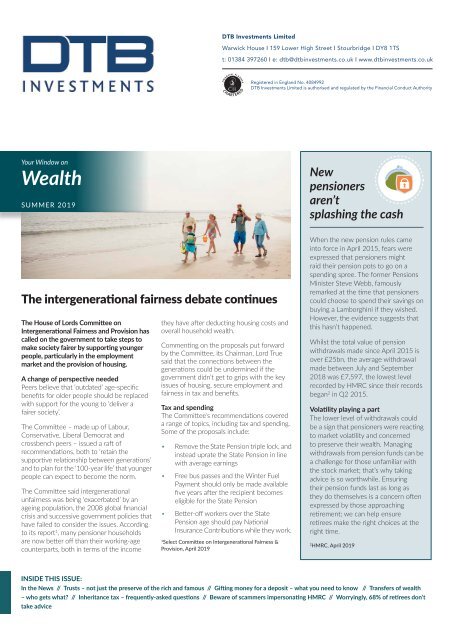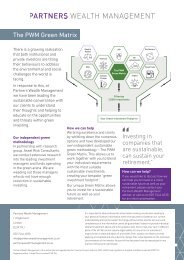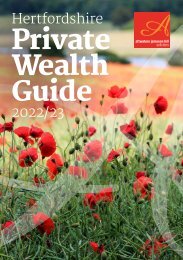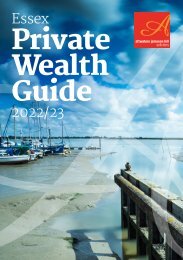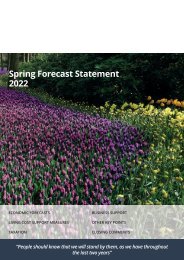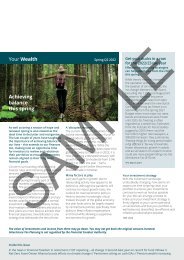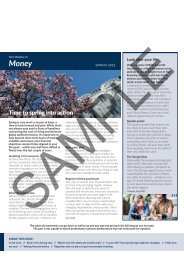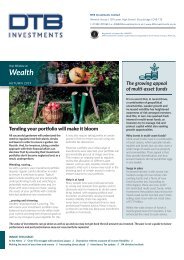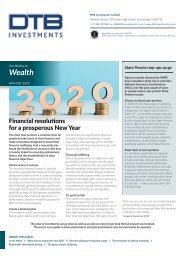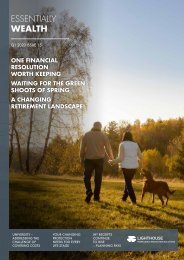DTB Investments Ltd_SummerNewsletter2019
You also want an ePaper? Increase the reach of your titles
YUMPU automatically turns print PDFs into web optimized ePapers that Google loves.
<strong>DTB</strong> <strong>Investments</strong> Limited<br />
Warwick House I 159 Lower High Street I Stourbridge I DY8 1TS<br />
t: 01384 397260 I e: dtb@dtbinvestments.co.uk I www.dtbinvestments.co.uk<br />
Registered in England No. 4084992<br />
<strong>DTB</strong> <strong>Investments</strong> Limited is authorised and regulated by the Financial Conduct Authority<br />
Your Window on<br />
Wealth<br />
SUMMER 2019<br />
New<br />
pensioners<br />
aren’t<br />
splashing the cash<br />
The intergenerational fairness debate continues<br />
The House of Lords Committee on<br />
Intergenerational Fairness and Provision has<br />
called on the government to take steps to<br />
make society fairer by supporting younger<br />
people, particularly in the employment<br />
market and the provision of housing.<br />
A change of perspective needed<br />
Peers believe that ‘outdated’ age-specific<br />
benefits for older people should be replaced<br />
with support for the young to ‘deliver a<br />
fairer society’.<br />
The Committee – made up of Labour,<br />
Conservative, Liberal Democrat and<br />
crossbench peers – issued a raft of<br />
recommendations, both to ‘retain the<br />
supportive relationship between generations’<br />
and to plan for the ‘100-year life’ that younger<br />
people can expect to become the norm.<br />
The Committee said intergenerational<br />
unfairness was being ‘exacerbated’ by an<br />
ageing population, the 2008 global financial<br />
crisis and successive government policies that<br />
have failed to consider the issues. According<br />
to its report 1 , many pensioner households<br />
are now better off than their working-age<br />
counterparts, both in terms of the income<br />
they have after deducting housing costs and<br />
overall household wealth.<br />
Commenting on the proposals put forward<br />
by the Committee, its Chairman, Lord True<br />
said that the connections between the<br />
generations could be undermined if the<br />
government didn’t get to grips with the key<br />
issues of housing, secure employment and<br />
fairness in tax and benefits.<br />
Tax and spending<br />
The Committee’s recommendations covered<br />
a range of topics, including tax and spending.<br />
Some of the proposals include:<br />
• Remove the State Pension triple lock, and<br />
instead uprate the State Pension in line<br />
with average earnings<br />
• Free bus passes and the Winter Fuel<br />
Payment should only be made available<br />
five years after the recipient becomes<br />
eligible for the State Pension<br />
• Better-off workers over the State<br />
Pension age should pay National<br />
Insurance Contributions while they work.<br />
1<br />
Select Committee on Intergenerational Fairness &<br />
Provision, April 2019<br />
When the new pension rules came<br />
into force in April 2015, fears were<br />
expressed that pensioners might<br />
raid their pension pots to go on a<br />
spending spree. The former Pensions<br />
Minister Steve Webb, famously<br />
remarked at the time that pensioners<br />
could choose to spend their savings on<br />
buying a Lamborghini if they wished.<br />
However, the evidence suggests that<br />
this hasn’t happened.<br />
Whilst the total value of pension<br />
withdrawals made since April 2015 is<br />
over £25bn, the average withdrawal<br />
made between July and September<br />
2018 was £7,597, the lowest level<br />
recorded by HMRC since their records<br />
began 2 in Q2 2015.<br />
Volatility playing a part<br />
The lower level of withdrawals could<br />
be a sign that pensioners were reacting<br />
to market volatility and concerned<br />
to preserve their wealth. Managing<br />
withdrawals from pension funds can be<br />
a challenge for those unfamiliar with<br />
the stock market; that’s why taking<br />
advice is so worthwhile. Ensuring<br />
their pension funds last as long as<br />
they do themselves is a concern often<br />
expressed by those approaching<br />
retirement; we can help ensure<br />
retirees make the right choices at the<br />
right time.<br />
2<br />
HMRC, April 2019<br />
INSIDE THIS ISSUE:<br />
In the News // Trusts – not just the preserve of the rich and famous // Gifting money for a deposit – what you need to know // Transfers of wealth<br />
– who gets what? // Inheritance tax – frequently-asked questions // Beware of scammers impersonating HMRC // Worryingly, 68% of retirees don’t<br />
take advice
Your Window on Wealth<br />
In the<br />
NEWS<br />
75% OF OVER-50s AREN’T SAVING<br />
FOR CARE<br />
New research 3 shows that although<br />
60% of those surveyed feared losing<br />
their savings and homes to pay for care<br />
fees, less than a quarter of adults aged<br />
over 50 are making any provision for<br />
later-life care.<br />
As people are living longer, it’s<br />
estimated that more than 143,000<br />
older people, over a third of the<br />
421,000 people currently receiving<br />
residential care, could face paying fees<br />
of £100,000 or more for their care.<br />
RETIREES IN THE DARK ABOUT<br />
ENHANCED ANNUITIES<br />
Buying an annuity is a way of providing<br />
a guaranteed income in retirement,<br />
but 70% of people questioned for a<br />
recent survey 4 were unaware that<br />
if they were to be suffering from poor<br />
health at the time of purchase, they<br />
might qualify for higher levels<br />
of income.<br />
Enhanced annuities pay higher rates<br />
based on your lifestyle or medical<br />
history. Factors such as smoking,<br />
diabetes, high blood pressure and<br />
heart disease could boost your income<br />
as a result of reduced life expectancy.<br />
Those suffering from conditions<br />
such as asthma, high cholesterol and<br />
obesity may also qualify for higher<br />
levels of income, depending on how<br />
serious their condition is.<br />
3<br />
Independent Age, April 2019<br />
4<br />
HL, April 2019<br />
Trusts – not just the preserve<br />
of the rich and famous<br />
Today, you don’t have to be incredibly rich<br />
for your family to benefit from the creation<br />
of a trust. They can offer long-term asset<br />
protection and have a variety of uses as<br />
part of financial planning strategies.<br />
A family trust can help protect your<br />
family’s assets for the benefit of future<br />
generations and may be used to protect<br />
the family home.<br />
What is a trust?<br />
A trust is a legal arrangement which allows<br />
assets, usually property or money, to be looked<br />
after by a trustee for the good of one or more<br />
beneficiaries. Those beneficiaries can be<br />
named individuals, such as your children, or<br />
can be children who are yet to be born.<br />
Why set up a trust?<br />
They can have a variety of uses such as:<br />
• Protecting the financial interests of a<br />
young beneficiary by retaining control of<br />
the assets until they reach the age of 18<br />
(16 in Scotland)<br />
• Looking after the interests of somebody<br />
who can’t handle their own financial<br />
affairs through incapacity<br />
• Providing for a husband or wife, while<br />
keeping the assets intact for the benefit<br />
of children<br />
• Reducing Inheritance Tax (IHT) liability<br />
by taking assets out of an estate, thereby<br />
reducing the amount on which IHT might<br />
otherwise be payable<br />
• Protecting assets on marriage<br />
• Ensuring that the proceeds from a life<br />
insurance policy go to the beneficiary<br />
without waiting for probate, and don’t<br />
form part of the estate for IHT purposes.<br />
Setting up a trust<br />
The choice of trust will depend on who the<br />
beneficiaries are, what the assets are, and<br />
how and when you want them distributed.<br />
Taking advice on the type of trust that is most<br />
suitable for your circumstances is best.<br />
The Financial Conduct Authority does not<br />
regulate some forms of taxation advice.<br />
2
Summer 2019<br />
Gifting money for<br />
a deposit – what<br />
you need to know<br />
Parents and grandparents keen to help<br />
their offspring get onto the housing ladder<br />
are increasingly helping them out with the<br />
money they need for their deposit. This<br />
can help reduce Inheritance Tax (IHT) too,<br />
but you need to be aware of the rules.<br />
Everyone has a yearly ‘gift’ allowance for IHT<br />
and can give away up to £3,000 each year. If<br />
you don’t use it, you can carry over any unused<br />
allowance from one tax year to the next up to<br />
a maximum of £6,000. This means you could<br />
give away up to £6,000, or £12,000 for<br />
a couple.<br />
Wedding gifts<br />
You can also make small gifts of up to £250<br />
per person per tax year to as many people as<br />
you like. Weddings are another opportunity<br />
to hand over cash to loved ones – parents<br />
can each give children £5,000 as wedding<br />
presents, and £2,500 to grandchildren or<br />
great-grandchildren, or £1,000 to anyone<br />
else, all free of IHT.<br />
You can make more significant gifts above<br />
and beyond those listed above, known as<br />
‘potentially exempt transfers’. You need to live<br />
for at least seven years after making the gift<br />
for it to be outside the estate for IHT.<br />
The Financial Conduct Authority does not<br />
regulate some forms of taxation advice.<br />
Everyone has a yearly ‘gift’ allowance<br />
for IHT and can give away up to<br />
£3,000 each year.<br />
Transfers<br />
of wealth<br />
– who gets what<br />
Data from the Office for National<br />
Statistics 5 show that various patterns<br />
are emerging in how wealth is<br />
transferred down the generations.<br />
Unsurprisingly, gifts and loans are<br />
more commonly made to those aged<br />
25–34, with 11% in this age bracket<br />
receiving more than £500 during<br />
the previous two years, with the<br />
average across all age groups being<br />
£2,000. This illustrates that parents<br />
are stepping in to help their offspring<br />
cope with times of major expense, like<br />
buying a house or starting a family.<br />
Inheritances come later in life<br />
The average inheritance across all<br />
age ranges during the previous two<br />
years was £11,000, with those aged<br />
55 to 64 most likely to receive larger<br />
inheritances, receiving on average<br />
£33,000. Those aged 65 and over<br />
inherited on average £20,000.<br />
This money was put into savings or<br />
investments by around 49%<br />
of recipients.<br />
This research serves to highlight<br />
that those who rely on receiving<br />
an inheritance instead of putting<br />
adequate pension provision in<br />
place might find they’ve reached<br />
retirement before they inherit.<br />
With gifts often given earlier in life,<br />
inheritances may be smaller in the<br />
years to come.<br />
5<br />
ONS, Oct 2018<br />
3
Your Window on Wealth | Summer 2019<br />
Inheritance Tax –<br />
frequently-asked<br />
questions<br />
BEWARE OF SCAMMERS<br />
IMPERSONATING HMRC<br />
Scammers are making threatening calls pretending to<br />
be from HMRC 6 and saying if the victim doesn’t pay out<br />
thousands of pounds immediately, they will be arrested.<br />
This is a particularly unpleasant scam, and more than<br />
60,000 calls are reported to have been made in the six<br />
months to January 2019.<br />
HMRC confirms that it will never call anyone out of the<br />
blue and demand payment, they will only ever call asking<br />
for payment on a debt that you have already been made<br />
aware of in writing. If you have been approached in this<br />
way, inform Action Fraud.<br />
6<br />
HMRC, 2019<br />
Who pays it?<br />
Inheritance Tax (IHT) is payable on a<br />
person’s death if their estate exceeds the<br />
IHT threshold, also known as the nil-rate<br />
band. IHT is charged at 40%, although the<br />
rate may be reduced to 36% if 10% or more<br />
of the estate over the threshold is left<br />
to charity.<br />
What is the threshold?<br />
The current threshold is £325,000 for<br />
an individual and £650,000 for a married<br />
couple or civil partners. An inheritance<br />
from husband, wife or civil partner is<br />
exempt from IHT and the survivor can<br />
claim their spouse’s unused nil-rate band<br />
upon their death.<br />
What is the main residence nil-rate band?<br />
This allowance applies if you want to pass<br />
your main residence to a direct descendant,<br />
such as a child or grandchild, therefore it<br />
isn’t available to everyone. For the tax year<br />
2019-20 the figure is £150,000 and will<br />
rise to £175,000 in 2020-21. When its<br />
fully introduced in April 2020, this could<br />
potentially mean that a single person<br />
has an overall allowance of £500,000,<br />
or £1m for those who are married or in a<br />
civil partnership.<br />
It is important to take professional advice<br />
before making any decision relating to<br />
your personal finances. Information within<br />
this newsletter is based on our current<br />
understanding of taxation and can be<br />
subject to change in future. It does not<br />
provide individual tailored investment<br />
advice and is for guidance only. Some<br />
rules may vary in different parts of the UK;<br />
please ask for details. We cannot assume<br />
legal liability for any errors or omissions<br />
it might contain. Levels and bases of, and<br />
reliefs from, taxation are those currently<br />
applying or proposed and are subject<br />
to change; their value depends on the<br />
individual circumstances of the investor.<br />
The value of investments can go down<br />
4<br />
as well as up and you may not get back<br />
the full amount you invested. The past is<br />
What is the seven-year rule?<br />
Gifts of wealth can be totally exempt if<br />
you survive for seven years after making<br />
them. Should you die within this period, the<br />
beneficiaries would potentially be liable for<br />
IHT, which is charged at 40% on gifts above<br />
the nil-rate band and given in the three<br />
years before the donor dies. The amount<br />
of IHT due gradually reduces (‘taper relief’)<br />
following the third year after the gift was<br />
made and every subsequent year until after<br />
the seventh year. Gifts are therefore not<br />
counted towards the value of your estate<br />
after seven years.<br />
What can I do to tackle my IHT liability?<br />
It pays to take advice. Putting off making<br />
plans can limit your options. For example, a<br />
substantial gift made to a beneficiary could<br />
potentially reduce or eliminate your IHT<br />
bill. However, you would need to survive<br />
seven years after making the gift for this to<br />
take full effect.<br />
The Financial Conduct Authority does not<br />
regulate some forms of taxation advice.<br />
not a guide to future performance and<br />
past performance may not necessarily<br />
be repeated. If you withdraw from an<br />
investment in the early years, you may<br />
not get back the full amount you invested.<br />
Changes in the rates of exchange may<br />
have an adverse effect on the value<br />
or price of an investment in sterling<br />
terms if it is denominated in a foreign<br />
currency. Taxation depends on individual<br />
circumstances as well as tax law and<br />
HMRC practice which can change.<br />
The information contained within this<br />
newsletter is for information only purposes<br />
and does not constitute financial advice.<br />
The purpose of this newsletter is to provide<br />
technical and general guidance and<br />
should not be interpreted as a personal<br />
recommendation or advice.<br />
WORRYINGLY, 68%<br />
OF RETIREES DON’T<br />
TAKE ADVICE<br />
If you’re looking ahead to your<br />
retirement, the good news is that<br />
nowadays there are more choices open<br />
to you than ever before. However,<br />
recent research 7 shows that many<br />
retirees may not be exploring these<br />
options and aren’t shopping around at<br />
retirement, selecting instead to take the<br />
annuity or drawdown facility offered to<br />
them by their existing provider.<br />
How advice can help<br />
A report from the Financial Conduct<br />
Authority 8 highlighted that those<br />
who didn’t take financial advice<br />
often struggled to choose between<br />
retirement options, and many ended<br />
up making poor investment decisions,<br />
or put their money into cash funds<br />
that provide low returns and risk being<br />
eroded by inflation.<br />
We can explain what the various<br />
choices available to you are, what they<br />
could mean for you, and help you make<br />
the right decisions for the future. We<br />
know that for many people this is a<br />
complex and bewildering area, so will<br />
explain everything in plain English and<br />
will be able to answer any queries you<br />
may have.<br />
7<br />
Canada Life, March 2019<br />
8<br />
FCA Financial Lives Survey, 2018<br />
IF YOU WOULD<br />
LIKE ADVICE OR<br />
INFORMATION<br />
ON ANY OF THE<br />
AREAS HIGHLIGHTED<br />
IN THIS NEWSLETTER,<br />
PLEASE GET IN TOUCH.<br />
SUMMER 2019 E&W


